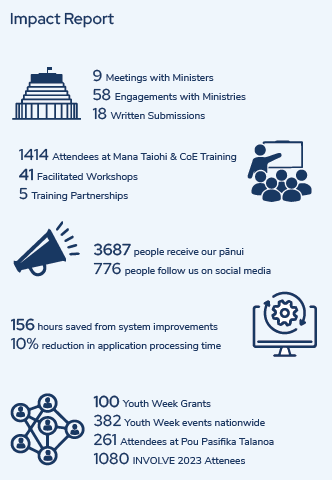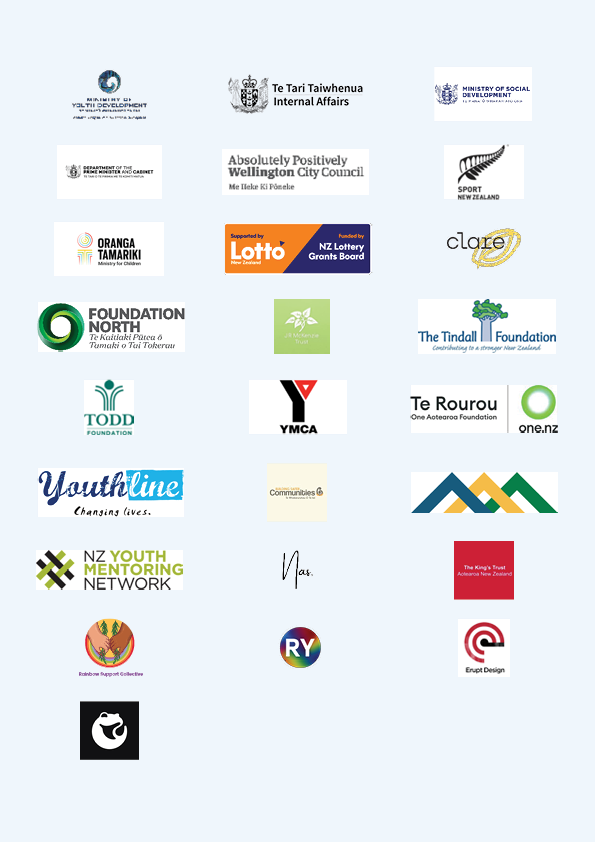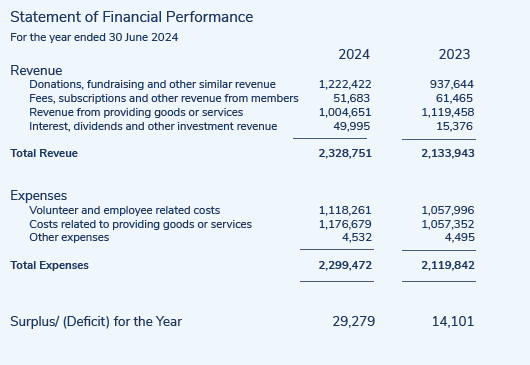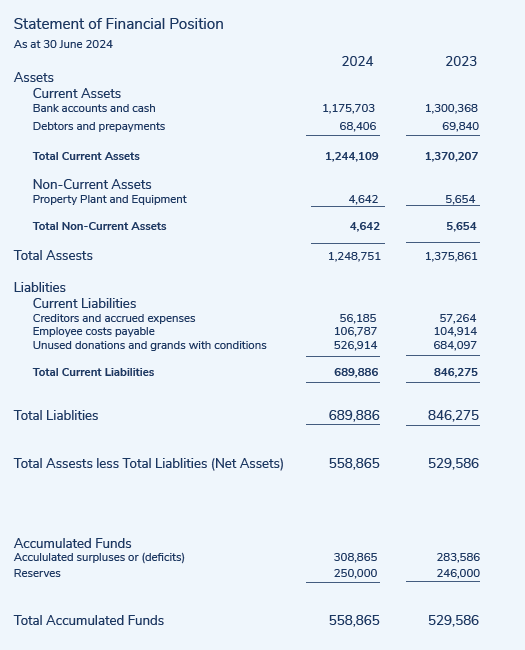Read our full report
CEO Report
The 2023-24 year has seen substantial change in the political and financial ecosystem that impacts on Taiohi and our sector. The new strategic (2024-2030) for Ara Taiohi introduces our vision of an empowered ecosystem of youth development that supports young people to thrive – He taiao whakapūmau whakawhanake taiohi, e pūāwai mai ai a rangatahi . We recognise the importance of all parts of the ecosystem working together for positive youth development to create better futures for Rangatahi. To achieve this in the current environment the Ara Taiohi Board anticipated the impending need for increased capacity in the advocacy space. This required us to review our structure to ensure our ability to be responsive and advocate for our sector and young people has been able to meet this demand.
Amongst the many highlights this year one standout is the INVOLVE conference that took place in Tāmaki Makaurau for the first time since 2010. The theme centred around the stars that guide us. Over 1000 members of the youth development community connected, laughed, and learnt, exploring how we navigate the current realities together with young people. Minister Willow-Jean Prime attended and launched the Ministry for Youth Development’s Youth Plan, which is framed around Mana Taiohi, including an action to embed Mana Taiohi across government. We were thrilled when after the election the new Minister for Youth, Matt Doocey, confirmed the Youth Plan would proceed, including the action of embedding Mana Taiohi across government. We have been working with MYD, our contractors Kirsten Smith and Matt Renata, as well as our team of young facilitators to develop a plan see this move forward.
It is impossible for me to try and name all the other highlights from this year, as I will inevitably miss something! Needless to say, across all areas we have worked tirelessly to champion, advocate and support capacity and capability of the youth development sector.
Our small team (for core Ara Taiohi of 8 humans, and just over 6 FTE, and a few stunning contractors) continue to give above and beyond to serve the wider sector. This year we have farewelled:
- Sarah Bradnock, who bought both structure and expertise into our communications space
- Piper Clare, who started as an intern and ended up employed to support both Youth Week and training, which she did with graciousness and integrity
- Jade Eru, who joined for a short stint supporting the release of the vol. 2, ed. 3 of Kaiparahuarahi focusing on INVOLVE, as well as supporting trainings.
We are grateful for all they gifted in their time with Ara Taiohi wish them all well the with exciting opportunities that have opened up to them.
We have welcomed into the team Aisling Carney as our Advocacy and Communications Advisor who has quickly become indispensable to the team, and Parris Petera whose efficiency and positivity have streamlined our training space.
The governance of our organisation is held by our Board, rōpū and kaiārahi. This team of people provides strategic direction with wisdom that is inspiring and deeply appreciated. This year we have a number of people leaving the Board for personal reasons, as well as the their terms coming to an end. I honour and acknowledge:
- Briarley Birch, who embodies the essence of Youth Work and Mana Taiohi and will always be one of my favourite humans in the world
- Annabel Prescott, whose strategic acumen and ability to keep things real has guided us through some particularly challenging times
- Chris Davison, who has (and continues to) serve Ara Taiohi in numerous different roles, always ensuring our organisation is safe and strong
- Josie Ogden-Schroeder who is stepping down as co-chair after serving 3 x 2-year terms, most recently as our co-chair. With our kaihautū Raniera Pene, Josie has led Ara Taiohi forward with passion, insight, and determination.
Ngā mihi kia koutou – thank you for all you have given.
As always I finish honouring and acknowledging the incredible work of our members. We often reflect that the best youth development work is invisible. If we do our jobs right communities will see young people shining, and the only people who know that youth workers exist are young people and their whānau. While we don’t see the mahi you do every day, but we do know the impact it makes for Rangatahi, whānau and communities in Aotearoa.
Kaua e rangiruatia te hāpai o te hoe e kore tō tātou waka e ū ki te uta.
Do not paddle, some of you with one stroke and some with another, or our canoe will not reach the shore.
We look forward to the coming year knowing there is no other community we would want to be rowing our waka with.
Ngā manaakitanga
Jane Zintl
CEO
Ara Taiohi
Co-Chairs’ Report
Tēnā koutou hoa o Ara Taiohi,
Ki te kotahi te kākaho ka whati, ki te kāpuia e kore e whati. When a reed stands alone it is vulnerable, but a group of reeds together is not easily broken.
This whakatauki resonates with the Board of Ara Taiohi. When we stand alone, we are vulnerable, but together we are unbreakable.
The year that we have had has seen many challenges, and if nothing else these challenges have demonstrated the immense importance of Ara Taiohi as Aotearoa’s peak body for youth development and youth workers. Ara Taiohi strengthens our sector with skills, knowledge, advocacy and support, making it unbreakable – and by so doing is upholding the mana of both our young people and our sector.
The Board has spent significant time this year reflecting on the longer-term questions about the purpose of the organisation. Conversations that have been rich in experience and context. We are so grateful for the expertise, wisdom and service of our Board colleagues, as we grappled with how to provide the staff of Ara Taiohi a road map that is both wide reaching and focused.
Ara Taiohi aims to enable and empower the youth sector to serve rangatahi well and to demonstrate to decision-makers that Youth Work saves lives and therefore must be high on any Government’s agenda. This ‘advocacy’ work is complex; being heard is no small feat when there are so many other agendas, and so much noise. We hope you take a moment to read our Impact Report which is a phenomenal A+ report card for the year that has been – we are small, but we are so mighty!
As a Board, we are full of pride and hope about what has been achieved and what can be achieved going forward – for our membership and for the social fabric of Aotearoa more broadly. Ara Taohi is making a meaningful difference to the world.
Ki te kotahi te kākaho ka whati, ki te kāpuia e kore e whati. This whakatauki also acknowledges the need for collective skills and resources to combine to achieve an outcome. A key part of the Board’s role is to ensure the kaimahi of Ara Taiohi have what they need to do their mahi. Our leadership focuses on collaboration and a climate of sincere respect.
Members and stakeholders of Ara Taiohi can be assured that the staff who are working for Ara Taiohi are service leaders who do not shy away from the most difficult of questions and problems. Their focus is always on what is best for rangatahi, and the many people who serve our sector, through thick and through thin. They reflect the commitment we see on the ground across Aotearoa New Zealand. They are soaring, and we will continue to live up to their example, as trustees.
On behalf of the Ara Taiohi Board, we send much gratitude, respect and admiration to all our members and stakeholders for your commitment to young people of Aotearoa.
Raniera Pene Josie Ogden Schroeder
Kaihautū / Co-Chair Co-Chair
Ngā Kaihoe
Ngā Kaihoe continues to lead efforts in supporting and strengthening Mātauranga Māori for kaimahi in the youth development sector. By embedding and sharing this knowledge, we bring Māori perspectives into the work of everyone in the ecosystem, ensuring that rangatahi are supported by practices grounded in the cultural identity of Aotearoa New Zealand. This approach not only uplifts Māori youth but also accelerates the holistic development of all young people in Aotearoa by creating spaces and places that respect and celebrate diversity.
Highlights of our year included working with our Kaiārahi rōpū who whakapapa and reside around the motu, INVOLVE – our biennial youth development conference where we create space for Ngā Kaihoe to connect, Hui ā Rohe in Taranaki, Te Hiku and Ōtautahi, and our Mana Taiohi and Code of Ethics roadshow trainings around the motu.
Central to our mission is the advocacy of Mana Taiohi in practice, ensuring the principles of Mana Taiohi are woven into the fabric of youth development, guiding practitioners toward ethical and culturally responsive practices. Mana Taiohi emphasises the mana of young people, ensuring they are at the heart of youth work, while also upholding the mana of those supporting them.
At the core of our advocacy is the cultivation of strong reciprocal relationships between kaimahi Māori and the wider youth development sector. We aim to create a sector that honours the
contributions of kaimahi Māori and integrates Mātauranga Māori as a vital component of youth development practices across Aotearoa.
Our work is further strengthened through the engagement of Kaihoe Waka, Māori who possess deep insights into working with young people in a culturally responsive way. Their expertise
ensures Māori perspectives are central in shaping the future of youth development, ensuring it remains both culturally affirming and future-focused.
Ngā Kaihoe also upholds the principles of Te Tiriti o Waitangi by ensuring equitable opportunities for Tangata Whenua in the governance of Ara Taiohi through a co-governance model. This reflects our commitment to honouring Te Tiriti in practice, ensuring shared leadership and decision-making. As kaitiaki of Mana Taiohi, we remain dedicated to uplifting indigenous practice within the youth development sector, ensuring that Mātauranga Māori continues to guide and inform all we do.
Korowai Tupu
Korowai Tupu continues to be a strong advocate for Youth Work and youth workers across Aotearoa, providing a unified voice that champions the value of our sector. Through our ongoing efforts, Korowai Tupu ensures that Youth Work remains visible and relevant in broader conversations about the wellbeing and development of young people. This advocacy includes amplifying the stories of youth workers on the frontlines, ensuring their experiences and insights are heard at all levels of decision-making. By representing the interests of its members, Korowai Tupu provides a critical platform for youth workers to engage with Kaimahi and influence policy that impacts the profession.
This year, Korowai Tupu has evolved to meet the current challenges facing youth workers, actively contributing to policy submissions and addressing pressing issues such as the proposed boot
camps. The organisation has taken a strategic approach to ensure that the voice of youth workers is not lost in these conversations, advocating for the use of Mana Taiohi and the Code of Ethics
(COE) as the gold standard in professional Youth Work practice. By doing so, Korowai Tupu reinforces the professionalisation of Youth Work, prioritising the safety and development of young people in all spaces they occupy.
At the heart of Korowai Tupu are the core competencies, developed in March 2008 as benchmarks for best practice. Initially based on the principles of youth development outlined in the Youth
Development Strategy of Aotearoa, these competencies described the strengths-based and rights-based approaches that define professional Youth Work. As Mana Taiohi now holds a crucial role in youth development, Korowai Tupu has updated its application process to reflect these principles, aligning with the principles embedded in Mana Taiohi. Today, the 10 Core Competencies – such as Tiriti-based practice, building identity, and ensuring holistic approach to working with young people – guide the work of youth workers across the country, continuing to set the gold standard for the profession.
Korowai Tupu has strengthened its communication efforts, focusing on amplifying the connection between the organisation and youth workers across the country. By sharing information through regional and existing networks, Korowai Tupu ensures that youth workers, regardless of context,are well-informed about the resources and support available to them. Efforts to clarify and define Youth Work, educate youth work practitioners, and promote adherence to the COE are essential in piercing through any confusion. Korowai Tupu continues to communicate the importance of Youth Work, inform youth workers of education pathways, and reset its approach to ensure that its message resonates with all members and the wider sector.
Te Ngākau Kahukura
This year, Te Ngākau Kahukura has continued to work across sectors and systems to make Aotearoa safer and more inclusive for rainbow people. Our work over the last year has engaged with kaupapa including homelessness, state care, gender-affirming healthcare, intersex health and wellbeing, human rights law, violence prevention, medical education, youth development, mental health and addictions, suicide prevention, statistics and data collection, and rainbow support sector development.
Our work continues to be guided by our five core strategies for systems change: educating decision-makers, embedding rainbow competence in professional training, building inclusion in services, developing accessible information, and growing rainbow support sector infrastructure.
Advising government decision-makers
Over the last year, we have been part of government advisory conversations related to human rights law, statistics and Census, health data, mental health promotion, trans and intersex healthcare, family and sexual violence prevention, housing and homelessness, and other kaupapa. We have engaged as members of formal advisory groups, as contracted experts, through submissions on laws and strategies, and through meetings with government officials and decision-makers.
The government context has shifted significantly since the election, and we have worked with the Rainbow Support Collective, Rainbow Violence Prevention Network, PATHA, and other key collaborators to articulate and share rainbow community priorities, and challenge potentially harmful decisions. This has included meeting new Ministers to discuss rainbow inclusion, making submissions and statements against some of the new government’s harmful priorities, and working with agencies to encourage them to continue rainbow work.
Building rainbow inclusion into housing and state care sectors
Our work to build rainbow inclusion into services focuses on working across sectors, or with large agencies. Two areas of service development focus this year have been housing and state care. Our Making Space project, which works across Auckland’s housing and homelessness sector, completed a successful pilot in early 2023, where an evaluation found that we had developed “a partnership-based relational model that meets providers where they are at and walks alongside them as they journey toward rainbow responsiveness.”
Over this year, we have secured additional fixed-term project funding to complete and publish a set of free resources and tools for housing providers across Aotearoa, based on the resources developed for the pilot. These are due to be published in late 2024. One service provider noted about their involvement in the pilot: “really awesome to not only ‘hear’ the drive to grow our understanding of the lived experience of rainbow people, but to also ‘see’ the growth in learning, practice change etc.”
This year we also worked closely with Oranga Tamariki to support them to implement the recommendations from the research report Making Ourselves Visible: The Experiences of Takatāpui and Rainbow Rangatahi in Care. We hosted an interim advisory group, supported the agency to develop role descriptions and hire their first ever rainbow-specific role, and gave advice on a cross-agency work programme to improve how takatāpui and rainbow young people in care are supported. This included advice about suicide prevention guidelines, housing of transgender young people in youth justice facilities, caregiver education and other aspects of practice and policy.
Developing capacity across the rainbow support sector
A key part of our strategy is growing infrastructure and capacity across the rainbow support sector, so that rainbow organisations and groups are more sustainable, rainbow people can access support and affirmation, and rainbow expertise can be shared more effectively with government and service providers. This work has been challenging this year in the context of reduced government funding for rainbow kaupapa.
Over the last two years, we have hosted two coordinator roles for the Rainbow Support Collective, which have improved capacity for the sector to advocate collectively to government, and for rainbow organisations to share resources and support each other. In recent months we have been reviewing the Collective’s progress and working with funders to seek further support for this work.
One Collective member reflected:
“These last two years in particular have been challenging for our communities and our organisations, and [the coordinators] have undoubtedly made the work of the RSC possible in this time, while supporting and enabling us to take better care of each other and our kaimahi.”
We have also remained key members of the Rainbow Violence Prevention Network, this year supporting challenging conversations with government about their decisions to deprioritise rainbow work.
Outside of formal networks, a key focus of our work is building peer relationships and conversations across the sector to support people who share kaupapa or challenges.
You can find more information about our vision, goals and Theory of Change on our website:https://www.tengakaukahukura.nz/about/our-vision-goals



